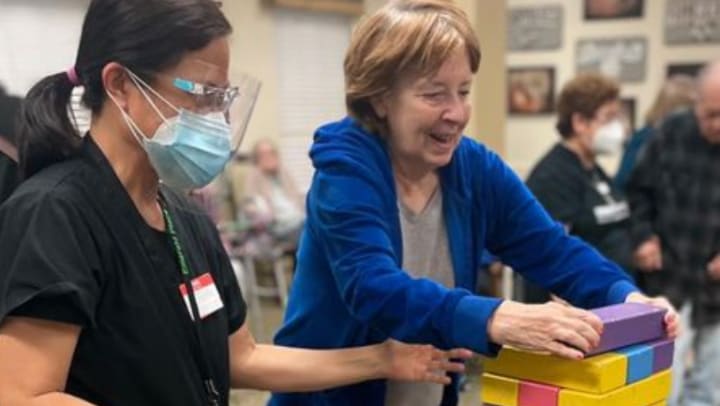
Have you played Wordle yet? Even if you haven’t, you’ve probably heard of this latest game frenzy as players proudly post their scores all over social media. It’s a fun little puzzle that challenges the player to put different letters together to eventually arrive at the “correct” five letter word. And the desire in all of us to test our abilities has led to Wordle becoming very popular indeed.
Many believe that playing games helps stimulate our brains and, therefore, is a good way to improve cognition and sharpen memory. Research has found that, in many ways, this is correct. And yet research also cautions us not to look to brain games as a replacement for human interaction and camaraderie.
The value of playing games is not so much the game, itself but the socialization around it.
Much of the value of playing games, like Wordle, is the social experience of sharing results and engaging in friendly competition with friends. An article in VeryWellMind.com recently cited insights from Assistant Professor of Psychology, Matthew Baldwin, who noted, “When we experience something together, the feelings get amplified so when we have fun with Wordle, that feeling is amplified when we remember that we are playing with millions of people at the same time.” This sense of having a common goal, creates what Dr. Baldwin refers to as “group cohesion”.
That doesn’t mean games don’t benefit our brains as well.
Research has indicated that games and word puzzles, like Soduku, crossword puzzles (and Wordle) force us to concentrate and use our problem-solving skills. This stimulates areas of our brains that studies have shown can help slow the progression of cognitive decline. Video games have also become popular in stimulating cognitive skills and are also known to improve response times and hand eye coordination, both of which are important to being able to perform the activities of daily living.
And yet, most research indicates that the greatest value derived from playing games comes through interaction with other players.
What does all this mean to those of you caring for loved ones living with dementia?
It means that you should encourage your loved one to play games with you and other family members. Games like checkers, cards and other games that are played together not only challenge the brain but inspire conversation and a sense of camaraderie that is so important to helping those with dementia connect with those around them.
At Anthem Memory Care communities, we love games. Whether it’s cornhole, Jenga, bingo or working a jigsaw puzzle together, we understand the value of personal interaction and socialization that games bring out in our residents and staff.
So, go ahead and break out a deck of cards or other favorite family game and “let the games begin”. And, a little Wordle here and there won’t hurt either!
(Our header image shows a resident of Emerald Place Memory Care in Glenview, Illinois participating in a rousing game of Jenga as fellow residents and staff cheer her on!)